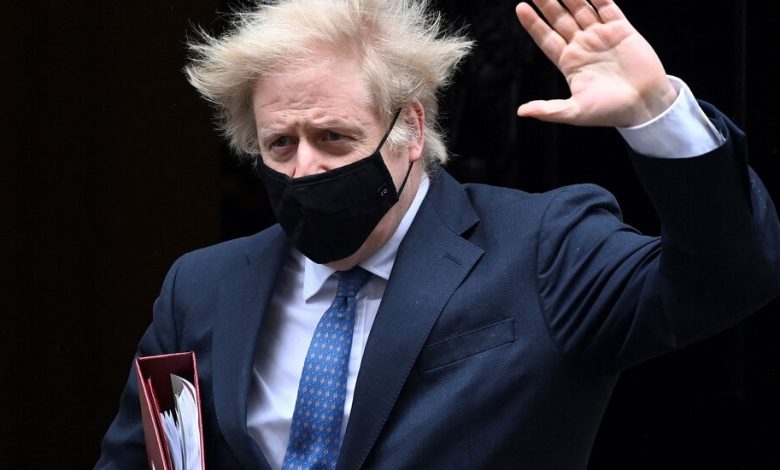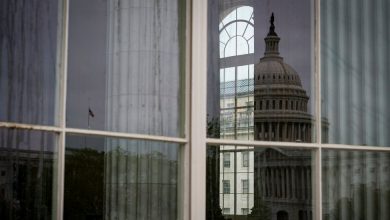Boris Johnson Faces New Indignity as He Awaits Vote in U.K. Parliament

Lawmakers were preparing to deliver another stinging blow on Monday to the parliamentary career of Britain’s divisive former prime minister Boris Johnson, as they considered whether to endorse a scathing report concluding that he deliberately misled colleagues over lockdown breaking parties in Downing Street.
Mr. Johnson resigned his seat 10 days ago after seeing an early draft of the findings of the yearlong investigation by a powerful committee of Parliament. He dismissed the committee as a “kangaroo court,” even though a majority of its members was drawn from his own Conservative Party.
The committee ultimately proposed revoking his parliamentary pass and said that, had he not already quit, it would have recommended a 90-day suspension from Parliament — an ignominious punishment for a former prime minister.
If a majority of lawmakers endorse the committee’s report, as expected, the practical effect on Mr. Johnson would be limited; losing his pass simply means he must be accompanied by another member if he wants to enter Parliament. But it would represent another embarrassing rebuke to a figure who was still prime minister this time last year and who in 2019 enjoyed enough popularity to win a landslide victory for his party.
The issue has also threatened to divide the governing Conservatives, led now by Rishi Sunak, who became prime minister last year. Mr. Johnson still has a contingent of lawmakers who support him and view the committee’s recommendations as overly harsh.
But, sensing his support was limited. Mr. Johnson ultimately urged sympathizers not to vote against the committee report.
Mr. Johnson, who turned 59 on Monday, is not expected to be in Parliament and it was unclear whether Mr. Sunak would attend the debate or how he — or many senior colleagues — would vote given the opportunity. On Sunday the housing secretary, Michael Gove, said he intends to abstain if there is vote.
That suggests that the parliamentary career of Mr. Johnson could end — for now at least — with less drama that he often generated during his roughly three years in Downing Street.
Mr. Johnson had made little secret of his ambitions to win back his old job as prime minister but, without a parliamentary seat, that would be impossible. An endorsement of the report by Parliament does not preclude Mr. Johnson from running again in the future, but most analysts think he is unlikely to try to do so in the next general election, which is expected in the second half of next year.
Opinion polls show that he is highly unpopular among voters in general, even if he retains the backing of a significant number of Conservative Party members who were drawn to his optimistic, pro-Brexit rhetoric.
Still, there is likely to be no shortage of criticism of Mr. Johnson from opposition lawmakers and some Conservatives who believe that he seriously undermined the standards expected of a prime minister. Misleading Parliament is considered a serious breach of the rules because, lawmakers argue, without accurate information from ministers they are unable to hold the government to account — one of their main functions.
In its report, the House of Commons privileges committee said Mr. Johnson had deliberately misled lawmakers when he assured them, after the “partygate” scandal emerged, that lockdown rules had always been followed in Downing Street.
In a hearing before the committee earlier this year, Mr. Johnson argued that his assurances were made in good faith. But the lawmakers found he had personal knowledge of some rule breaking, had failed to investigate other allegations properly, and that he had committed multiple “contempts” of Parliament, including through his verbal attacks on the committee.
The persistent focus on the fallout from the scandal is a political headache for Mr. Sunak. He now faces several difficult tests of his government’s popularity in elections to replace Mr. Johnson and a handful of other colleagues in the constituencies they represented.
One ally of Mr. Johnson, Nigel Adams, resigned after failing to secure a seat in the House of Lords; a second who is in the same situation, Nadine Dorries, has threatened to quit though she has not done so yet; and another Conservative lawmaker, David Warburton, stepped down after he was suspended over allegations of sexual misconduct. Mr. Warburton claimed he was denied a fair hearing by a parliamentary watchdog looking into the claims against him.
To add to Mr. Sunak’s problems, the police have said they will review a newly published video obtained by the Daily Mirror that appeared to show Conservative staff drinking and dancing at a time when pandemic restrictions were in force. Police had said that a previously published photo of the same event represented insufficient evidence to prosecute.
Around two dozen people were reported to be at the party, including Shaun Bailey, who campaigned unsuccessfully to become London mayor and who was elevated to the House of Lords by Mr. Johnson as part of his resignation honors list.
Mr. Bailey left before the video was taken, though one aide who received a lesser honor on the same list, Ben Mallet, does make an appearance. Opposition politicians have called for both men to be deprived of their honors.




